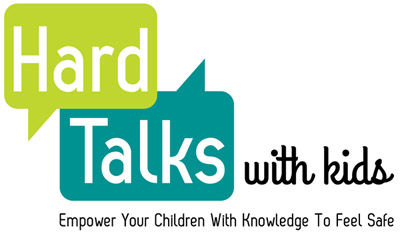

Police Brutality? Aggressive Presidential Campaigns? Tips on Approaching Your Child’s Fears – by Patty Wipfler
hard talks September 26, 2016 admin 0

Between Police Brutality and the recent presidential campaigns…how are we as parents supposed to talk to our kids about such complicated issues? Well if you kid is bringing his or her fears to you, you’re already a step in the right direction. Patty Wipfler of Hand in Hand Parenting offers some advice. – Estée Pouleris
When your child brings his fears to you, it’s because you’re a good parent. Your child trusts you and is looking to you to ease his fear. And you can help! There are some simple tools that will help build his confidence, and yours.
- Step One in the healing process is noticing the symptoms of fear—the behavior changes that tell you your child is tense, defensive, withdrawn, or preoccupied.
- Step Two is to find someone to talk to about how you feel. This step doesn’t occur to us often—we parents see most problems our children present as wholly resting in them. But in fact, as soon as we’re concerned, irritated, sad, baffled, angry, or afraid ourselves, we, too, need a bit of help! A fearful child needs a relaxed, confident parent to help them dislodge the fear. The tension we feel is an issue.Find a listener. Ask them to listen while you talk about what it feels like to see your child struggling. You could enlist a friend or colleague to listen to you, or you might pay a counselor. There’s an art to listening, but essentially, all you need is a warm person who will support you to work things out in your own way. No advice. No interruptions. No judgment. At Hand in Hand Parenting, we encourage parents to exchange this kind of listening. You can learn more about it in our booklet, Listening Partnerships for Parents.Talk about what it feels like to see your child frightened by harsh, hurtful behavior. What is it like to want to protect them from all harm, yet know that you can’t shield them fully? What upsets you? What do you wish you could do about it? Air these feelings!In talking to someone you trust, your own fear will release its hold when you can have a good cry, feel that fear and tremble, or, oddly enough, enjoy some hearty laughter. To get to this healthy release of tension, let your imagination run free. Imagine yourself all-powerful, slashing your way through a thicket of foes to rescue your child from danger. Imagine emphatically speaking your mind. Let off some steam, out of earshot of your child. This will help you relax when your child brings his fears to you.
- Step Three in shaking off fear depends upon your child.
- If your child can talk about her fears and cry or tremble, she is healing already. She is doing exactly what she needs to do. Listen. Don’t say much. Maintain eye contact, and keep showing her that you think she is safe at this moment. You might say, “I’m right here, and I won’t go away,” or, “Whatever frightened you is not happening right now. You’re safe with me.” The harder and longer she cries, the more relieved she will feel afterward! At Hand in Hand, we call this Staylistening.
- If your child seems tightly wound or frozen in fear, find a way to start some play! Fear makes for constriction, caution, and quiet. Play is the antithesis of fear. It is spontaneous, freewheeling, and physical. Dr. Lawrence Cohen, author of Playful Parenting, suggests letting your child figure out how to get play going. “Oh, you’re scared of that? Well, OK! Let’s make up a game about it? What do you suggest?” You can spark things by offering to let your child play at posing the menace she is scared of. Or you can play that role, if she would rather. But when you play the dreaded foe, do it badly! Be a gimpy, confused bad guy who holds the rifle backwards, or tries to sneak into a room by clomping loudly, while muttering, “Where are my victims! I can’t find any people in here to clobber…Oh, there’s one,” as you head toward a lamp or the settee to tie it up. You’ll want to spark laughter with your incompetence.If your child is the foe and you’re the victim, use humor and creativity. Loudly advertise your attempts to lay little snares for them. Out loud, plan to pelt them with pillows, or pretend to put chewing gum down for them to step in. Fail, fail, and fail again! What tickles a child’s funny bone is to see an adult being the incompetent one.When your child is laughing, her confidence is building. Her faith in you is growing stronger. Her mental picture of her own power grows stronger. We call eliciting a child’s laughter in play (without tickling) Playlistening, and it’s a powerful agent of change!The laughter your child does when you Playlisten will open other doors. She may be able to cry hard with you when you cut her toast “the wrong way” the next morning. She may wake up in the night crying because of a frightening dream. These spontaneous releases of emotional tension are very likely part of an overall healing process you’ve started. Just Staylisten until your child recovers her sense of safety. She will have healed some fear, and you’ll notice real gains in the coming days.
A confident parent, willing to play and to listen to big, untamed feelings is the key to dissolving a child’s fears. You can spark healing from within your child. You will do that best when you take some time to be listened to about your own fears. It is an unusual step, but one that will move both you and your child forward.
Together with Tosha Schore, M.A., I’ve written a book that has an ample section on helping children with their fears. Listen: Five Simple Tools for Meeting Everyday Parenting Challenges, is available at www.handinhandparenting.org. We hope it will help you with strategies for building your child’s confidence and meeting the challenges of parenting in today’s complex world.
Subscribe to Hard Talks With Kids
Patty Wipfler
Patty Wipfler is the author of Listen: Five Simple Tools to Meet Your Everyday Parenting Challenges and the founder of the non-profit organization Hand in Hand Parenting. During her 40 years of work with parents and children Patty Wipfler has developed a revolutionary parenting approach based on a fresh understanding of the way relationships in the family affect children’s behavior and ability to learn. Since then, more than 800,000 copies of her Listening to Children series have been sold. Patty continues to train hundreds of therapists, social workers, and parent educators in the US and 10 other countries, and offers parents accessible support for the vital work of parenting through HandinHandParenting.org.

No comments so far.
Be first to leave comment below.